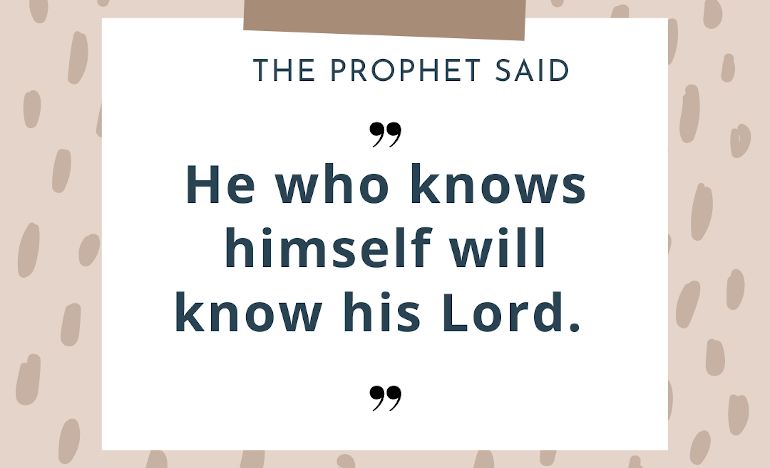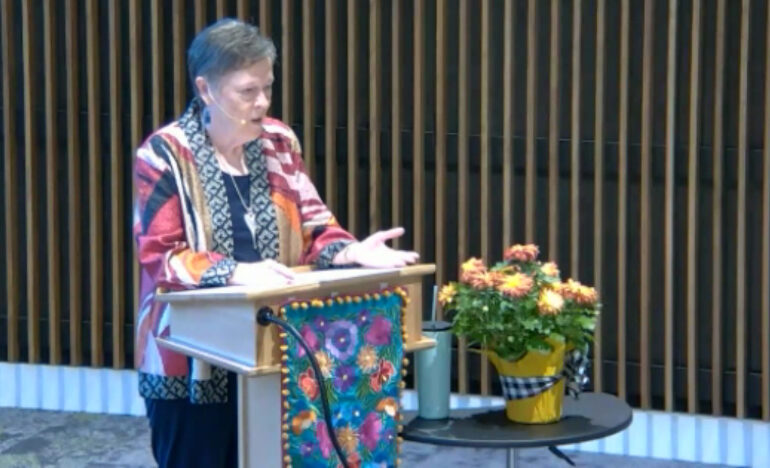Ushering in the Fullness of Our Being and Dismantling the False Self

By Kathy Keary
Part 5. The full series is here: The Contemplative Spirit of Islam.
Christian spiritual masters often speak of the need to dismantle our false self to reveal our true self. The 13th century Dominican, Meister Eckhart, described this as the living presence of God’s image implanted in the soul. We refer you to our series on this topic from a Christian perspective.
Islamic texts discuss this same idea. In his book, Spiritual Gems of Islam, Imam Jamal Rahman points out that the Qur’an describes three stages of the ego. The purpose of the spiritual path is to work through these stages until we reach the point of complete surrender of our ego to the Divine. Rahman describes this as “the deep alignment of our ego-driven personality with the sacred essence at the core of our being” (38).
In the first stage, the ego manipulates us leading us down a wrong path. With a highly inflated opinion of itself, the ego tries to dominate us and will even cross into unethical conduct to maintain its sense of superiority. With compassion, effort and vigilance, the “commanding master” can be transformed into a “personal assistant.”
In the second stage, we become aware of the voice of our conscience that promotes ethical choices. Rahman elaborates: “If we are persistent in resisting the unworthy urgings of the commanding master and reinforce our efforts with spiritual practices such as prayer and fasting, we will transform the competitive ego into a collaborative ego.”
In the third stage, inner peace is experienced as the ego aligns with the individual’s sacred essence. Difficulties in life do not vanish, but trials no longer unravel us. (Gems, 42).
In his book, The Fragrance of Faith: The Enlightened Heart of Islam, Rahman emphasizes that considerable work is required to dismantle the ego. In Islam, this effort is called jihad. He describes this jihad as a holy undertaking ordained by God. God did not place us on earth as perfect individuals. We are called to walk the arduous path that leads to the treasure housed in the core of our being (32).
Rahman comments that our main undertaking in life is to discover and confront who we really are. This is not an easy task. He describes this pursuit as an “unfolding from within,” and asserts that this work is necessary to “usher in the fullness of our being,” In the words of the Prophet Muhammad: “He who knows himself will know his Lord” (31).
In his book, Sufism: The Transformation of the Heart, Llewellyn Vaughan-Lee describes that path of inner transformation as both a spiritual and psychological pursuit. He describes the spiritual work as an awakening of a higher state of consciousness that he names as the “consciousness of the heart.” In coping with the challenges of life, we develop mechanisms that hamper our spiritual awareness and growth. Eliminating these from our life requires psychological work. He elaborates:
Psychological work prepares the psyche for the intensity of inner experience; it creates an empty, uncontaminated inner space for the awakening of our own divine nature. The psychological process of individuation is a preparation for the mystical encounter with God (46).
Vaughan-Lee asserts that the processes of inner transformation in Sufism is comparable to the Jungian concept of individuation leading the person from the ego to the Self. Transformation begins by acknowledging and confronting our shadow. Through the practice of meditation, that which has been rejected and repressed surfaces from the unconscious exposing our dark side. The shadow holds the key to understanding our true self (47, 48).
In his book, The Knowing Heart: A Sufi Path of Transformation, Kabir Helminski wisely instructs:
Only Love can tame the ego and bring it into the service of Love. … In order to really love, our ego structure has to dissolve and re-form on a new basis. Our hearts may have to be broken, our false pride humbled. Love then re-creates the self. … Sometimes it is not until we know our helplessness and our failure at love that we can come under the grace of love. This is the great value of the humiliation of sin and failure, because our ego, the shell that keeps love out, has broken open (49, 50).
Stay tuned for our next article where we will delve into a related subject, a key principle of Islam: surrender.
NOTE: The Renewal Center staff will be leading a book discussion on Rahman’s book Spiritual Gems of Islam on Saturdays and Tuesdays in June.
References
Helminski, Kabir. The Knowing Heart: A Sufi Path of Transformation. Boston, Massachusetts: Shambhala Publications, Inc, 1999.
Rahman, Jamal. Spiritual Gems of Islam: Insights and Practices from the Qur’an, Hadith, Rumi and Muslin Teaching Stories to Enlighten the Heart and Mind. USA: Skylight Path Publishing, 2013.
Rahman, Jamal. The Fragrance of Faith: The Enlightened Heart of Islam. Bath, England: The Book Foundation, 2004.
Vaughan-Lee, Llewellyn. Sufism: The Transformation of the Heart. Point Reyes, California: The Golden Sufi Center, 1995.
[Kathy Keary, a Precious Blood Companion and spiritual director, holds a master’s degree in theological studies and is a graduate of the Atchison Benedictine’s Sophia Center’s Souljourners Program, an intense study of spirituality and spiritual direction. Kathy believes that the divine is present and active in all of life and encourages others to be awakened to the God in all including the divine within. She enjoys accompanying others on their journey to wholeness discovering the person they were created to be.]
We’d Like to Hear From You!
We’d like to know what you think about this article. Send us a comment using the form below. Do you have a suggestion? Is there something you want to learn more about? Send us a note.
Related

Discover Lectio Divina
Presented by Kathy Keary
This is a recording of “Discover Lectio Divina” presented by Kathy Keary at Precious Blood Renewal Center in Liberty, Missouri, on Oct. 2, 2025.

Do You Hear What I Hear?
By Fr. Garry Richmeier, C.PP.S.
How can we avoid the harmful affects of the polarization that characterizes so much of our lives these days? One step toward this end is to cultivate a greater understanding and appreciation for the idea of relativity in human behavior.
Categories
Assembling God's Puzzle Coffee with Padre Cooking & Spirituality Encounters of the 4th Kind Family Matters Guided Meditations Reflections on the Eucharsitic Prayers Spiritual Resources Taize Prayers Teach Us to Pray The Contemplative Life Traveling with Pilgrims of Hope Uncategorized Videos Week of Prayer for Christian Unity When you need a little help
